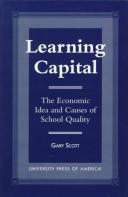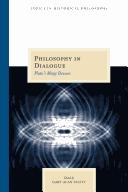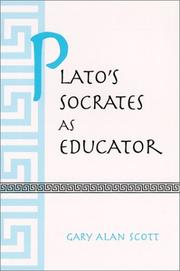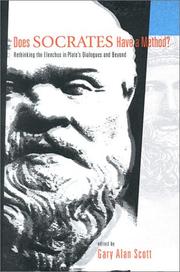| Listing 1 - 10 of 12 | << page >> |
Sort by
|

ISBN: 0761804897 0761804900 Year: 1997 Publisher: Lanham : University Press of America,
Abstract | Keywords | Export | Availability | Bookmark
 Loading...
Loading...Choose an application
- Reference Manager
- EndNote
- RefWorks (Direct export to RefWorks)
Education --- Educational equalization --- Academic achievement --- Démocratisation de l'enseignement --- Succès scolaire --- Economic aspects --- Finance --- Aspect économique --- Finances
Book
ISBN: 0379004151 Year: 1975 Publisher: Leiden : A.W. Sijthoff,
Abstract | Keywords | Export | Availability | Bookmark
 Loading...
Loading...Choose an application
- Reference Manager
- EndNote
- RefWorks (Direct export to RefWorks)
China --- Chine --- Foreign relations --- Treaties --- Relations extérieures --- S09/0350 --- S08/1100 --- 341.24 <51> --- 815 Geschiedenis --- 820 Internationale Betrekkingen --- 821 Internationaal Recht --- 841 Politiek Bestel --- 883.2 Oost-Azië --- China: Foreign relations and world politics--International conferences and treaties: since 1949 --- China: Law and legislation--International law --- Internationaal verdragsrecht--China --- -Treaties. --- -S09/0350 --- 341.24 <51> Internationaal verdragsrecht--China --- -China --- Relations extérieures --- Cina --- Kinë --- Cathay --- Chinese National Government --- Chung-kuo kuo min cheng fu --- Republic of China (1912-1949) --- Kuo min cheng fu (China : 1912-1949) --- Chung-hua min kuo (1912-1949) --- Kina (China) --- National Government (1912-1949) --- China (Republic : 1912-1949) --- People's Republic of China --- Chinese People's Republic --- Chung-hua jen min kung ho kuo --- Central People's Government of Communist China --- Chung yang jen min cheng fu --- Chung-hua chung yang jen min kung ho kuo --- Central Government of the People's Republic of China --- Zhonghua Renmin Gongheguo --- Zhong hua ren min gong he guo --- Kitaĭskai︠a︡ Narodnai︠a︡ Respublika --- Činská lidová republika --- RRT --- Republik Rakjat Tiongkok --- KNR --- Kytaĭsʹka Narodna Respublika --- Jumhūriyat al-Ṣīn al-Shaʻbīyah --- RRC --- Kitaĭ --- Kínai Népköztársaság --- Chūka Jinmin Kyōwakoku --- Erets Sin --- Sin --- Sāthāranarat Prachāchon Čhīn --- P.R. China --- PR China --- Chung-kuo --- Zhongguo --- Zhonghuaminguo (1912-1949) --- Zhong guo --- République Populaire de Chine --- República Popular China --- Catay --- VR China --- VRChina --- 中國 --- 中国 --- 中华人民共和国 --- Jhongguó --- Bu̇gu̇de Nayiramdaxu Dundadu Arad Ulus --- Bu̇gu̇de Nayiramdaqu Dumdadu Arad Ulus --- Bu̇gd Naĭramdakh Dundad Ard Uls --- Khi︠a︡tad --- Kitad --- Dumdadu Ulus --- Dumdad Uls --- Думдад Улс --- Kitajska --- -341.24 <51> --- China (Republic : 1949- ) --- Treaties. --- PRC --- P.R.C. --- BNKhAU --- БНХАУ

ISBN: 9780810123564 9780810123540 0810123568 0810123541 Year: 2007 Publisher: Evanston, Ill. : Northwestern University Press,
Abstract | Keywords | Export | Availability | Bookmark
 Loading...
Loading...Choose an application
- Reference Manager
- EndNote
- RefWorks (Direct export to RefWorks)
Dialectic. --- Dialectique --- Plato. --- Dialectic --- Polarity --- Polarity (Philosophy) --- Aflāṭūn --- Aplaton --- Bolatu --- Platon, --- Platonas --- Platone --- Po-la-tʻu --- Pʻŭllatʻo --- Pʻŭllatʻon --- Pʻuratʻon --- Πλάτων --- אפלטון --- פלאטא --- פלאטאן --- פלאטו --- أفلاطون --- 柏拉圖 --- 플라톤 --- Plato --- Platon --- Platoon --- Платон --- プラトン

ISBN: 0791447235 0791447243 9780791447239 9780791447246 Year: 2000 Publisher: Albany (N.Y.): State university of New York press,
Abstract | Keywords | Export | Availability | Bookmark
 Loading...
Loading...Choose an application
- Reference Manager
- EndNote
- RefWorks (Direct export to RefWorks)
Methodology --- Philosophy --- History. --- Study and teaching --- Socrates. --- Plato. --- Mental philosophy --- Humanities --- History --- Study and teaching&delete& --- Socrates --- Socrate --- Socrates Constantinopolitanus Scholasticus --- Humanities Methodology --- Methodology - History. --- Philosophy - Study and teaching - History. --- Plato. - Lysis. --- Plato. - Symposium. --- Plato. - Alcibiades I. --- Sokrates
Year: 1975 Publisher: Leiden Sijthoff
Abstract | Keywords | Export | Availability | Bookmark
 Loading...
Loading...Choose an application
- Reference Manager
- EndNote
- RefWorks (Direct export to RefWorks)

ISBN: 0585431078 9780585431079 0791447235 9780791447239 0791447243 9780791447246 0791491927 Year: 2000 Publisher: Albany, N.Y. State University of New York Press
Abstract | Keywords | Export | Availability | Bookmark
 Loading...
Loading...Choose an application
- Reference Manager
- EndNote
- RefWorks (Direct export to RefWorks)
Despite his ceaseless efforts to purge his fellow citizens of their unfounded opinions and to bring them to care for what he believes to be the most important things, Plato's Socrates rarely succeeds in his pedagogical project with the characters he encounters. This is in striking contrast to the historical Socrates, who spawned the careers of Plato, Xenophon, and other authors of Socratic dialogues. Through an examination of Socratic pedagogy under its most propitious conditions, focusing on a narrow class of dialogues featuring Lysis and Alcibiades, this book answers the question: "why does Plato portray his divinely appointed gadfly as such a dramatic failure?"
Methodology --- Philosophy --- Philosophy & Religion --- Mental philosophy --- Humanities --- History. --- Study and teaching --- History --- Socrates. --- Plato. --- Socrates --- Socrate --- Sokrates --- Sokrat, --- Sokrates, --- Suqrāṭ, --- Su-ko-la-ti, --- Sugeladi, --- Sokuratesu, --- Sākreṭīsa, --- Socrate, --- سقراط, --- Σωκράτης,

ISBN: 0271032219 9780271032214 027102173X 9780271021737 9780271023472 9780271049892 0271023473 Year: 2002 Publisher: University Park (Pa.): Pennsylvania state university press,
Abstract | Keywords | Export | Availability | Bookmark
 Loading...
Loading...Choose an application
- Reference Manager
- EndNote
- RefWorks (Direct export to RefWorks)
Although ";the Socratic method"; is commonly understood as a style of pedagogy involving cross-questioning between teacher and student, there has long been debate among scholars of ancient philosophy about how this method as attributed to Socrates should be defined or, indeed, whether Socrates can be said to have used any single, uniform method at all distinctive to his way of philosophizing. This volume brings together essays by classicists and philosophers examining this controversy anew. The point of departure for many of those engaged in the debate has been the identification of Socratic method with ";the elenchus"; as a technique of logical argumentation aimed at refuting an interlocutor, which Gregory Vlastos highlighted in an influential article in 1983. The essays in this volume look again at many of the issues to which Vlastos drew attention but also seek to broaden the discussion well beyond the limits of his formulation. Some contributors question the suitability of the elenchus as a general description of how Socrates engages his interlocutors; others trace the historical origins of the kinds of argumentation Socrates employs; others explore methods in addition to the elenchus that Socrates uses; several propose new ways of thinking about Socratic practices. Eight essays focus on specific dialogues, each examining why Plato has Socrates use the particular methods he does in the context defined by the dialogue. Overall, representing a wide range of approaches in Platonic scholarship, the volume aims to enliven and reorient the debate over Socratic method so as to set a new agenda for future research. Contributors are Hayden W. Ausland, Hugh H. Benson, Thomas C. Brickhouse, Michelle Carpenter, John M. Carvalho, Lloyd P. Gerson, Francisco J. Gonzalez, James H. Lesher, Mark McPherran, Ronald M. Polansky, Gerald A. Press, François Renaud, and W. Thomas Schmid, Nicholas D. Smith, P. Christopher Smith, Harold Tarrant, Joanne B. Waugh, and Charles M. Young.
Methodology --- History. --- Socrates. --- Socrates --- Socrate --- History --- Philosophy, Ancient. --- Philosophie ancienne --- Humanities Methodology --- Methodology - History. --- filosofie --- 1 --- Sokrates --- Sokrat, --- Sokrates, --- Suqrāṭ, --- Su-ko-la-ti, --- Sugeladi, --- Sokuratesu, --- Sākreṭīsa, --- Socrate, --- سقراط, --- Σωκράτης,
Book
Year: 1975 Publisher: Leiden Sijthoff
Abstract | Keywords | Export | Availability | Bookmark
 Loading...
Loading...Choose an application
- Reference Manager
- EndNote
- RefWorks (Direct export to RefWorks)
Book
Year: 1975 Publisher: Dobbs Ferry, Oceana Leiden, Sijthoff
Abstract | Keywords | Export | Availability | Bookmark
 Loading...
Loading...Choose an application
- Reference Manager
- EndNote
- RefWorks (Direct export to RefWorks)
Book
ISBN: 0791477665 1441621075 9781441621078 9780791477663 0791475832 0791475840 9780791475836 9780791475843 Year: 2008 Publisher: Albany, NY State University of New York Press
Abstract | Keywords | Export | Availability | Bookmark
 Loading...
Loading...Choose an application
- Reference Manager
- EndNote
- RefWorks (Direct export to RefWorks)
Erotic Wisdom provides a careful reading of one of Plato's most beloved dialogues, the Symposium, which explores the nature and scope of human desire (erôs). Gary Alan Scott and William A. Welton engage all of the dialogue's major themes, devoting special attention to illuminating Plato's conception of philosophy. In the Symposium, Plato situates philosophy in an intermediate (metaxu) position—between need and resource, ignorance and knowledge—showing how the very lack of what one desires can become a guiding form of contact with the objects of human desire. The authors examine the concept of intermediacy in relation both to Platonic metaphysics and to Plato's moral psychology, arguing that philosophy, for Plato, is properly understood as a kind of "being in-between," as the love of wisdom (philosophia) rather than the possession of it.
Love --- Plato. --- Socrates. --- Socrates --- Socrate --- Sokrates --- Sokrat, --- Sokrates, --- Suqrāṭ, --- Su-ko-la-ti, --- Sugeladi, --- Sokuratesu, --- Sākreṭīsa, --- Socrate, --- سقراط, --- Σωκράτης,
| Listing 1 - 10 of 12 | << page >> |
Sort by
|

 Search
Search Feedback
Feedback About UniCat
About UniCat  Help
Help News
News